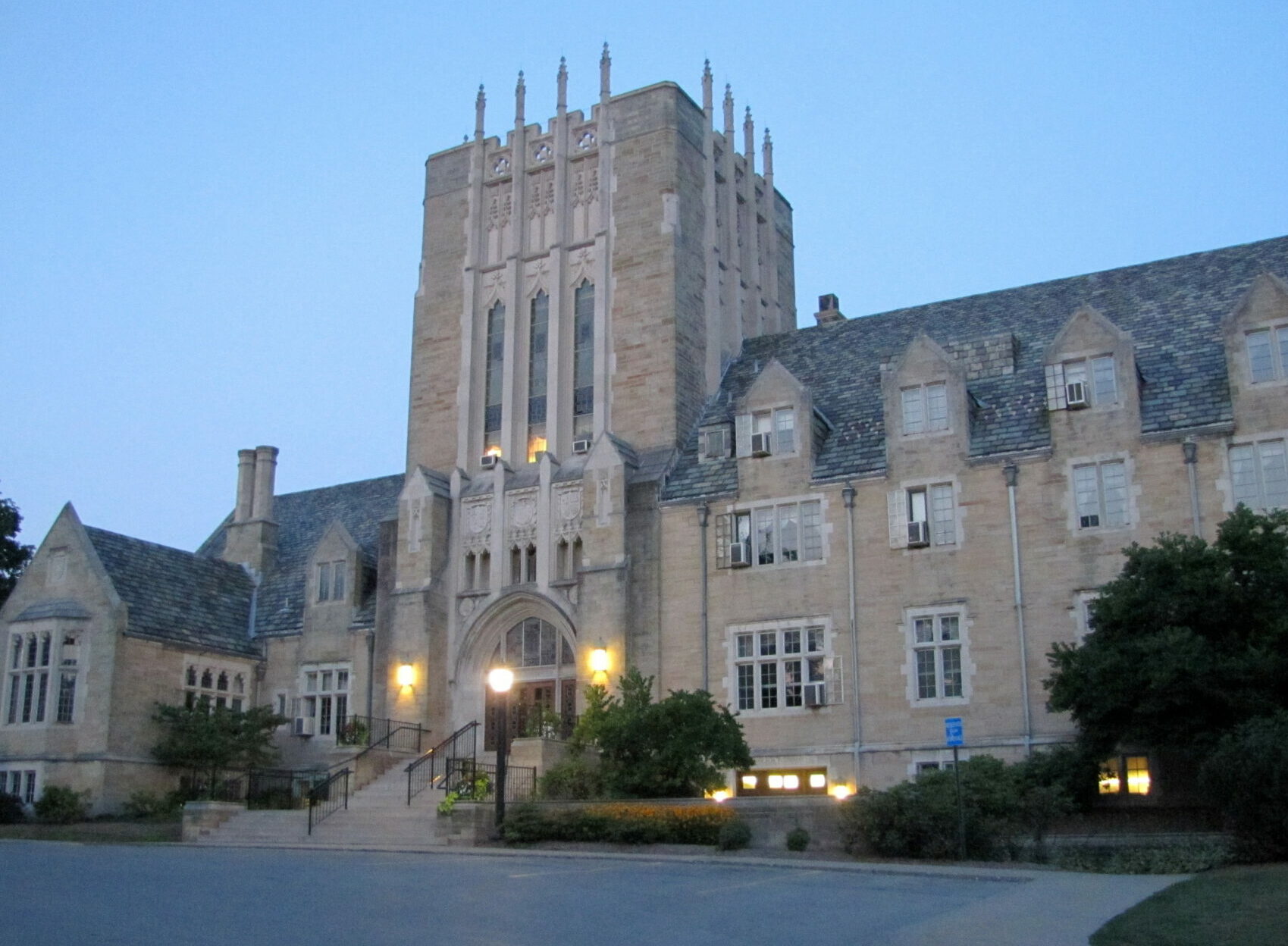Grove City, PA. College is a strange place. It is a place to which we students form deep connections and memories. And yet it is a transient thing.
College is not permanent. It can be a wonderful place, as is my soon-to-be alma mater Grove City College, but it is a passing stage in life. I have been fortunate to be able to form connections with resplendent people and to be part of a community while I have been here—whether those people are the group of friends who lustily sing hymns together every Saturday night in Harbison Chapel, or the professors and students of the small philosophy department, or the group of us who make the small trek to Rocky Springs PCA church every Sunday. Perhaps it is a product of a fallen world that some of the most formative years of our lives – our college years – are also years in which most of us cannot establish roots in the place where we will spend the rest of our lives. Yet this curse, if it is treated in the right way, could also be a blessing—or at least a training ground.
Graduation and the changes that it sets into motion will come. I will be 3,000 miles away from my fiancée as she finishes her time here, and I will begin my time at another institution. I will have to start forming new connections at another place of education at which it is doubtful I will remain for more than three years. I will again forego the virtues of a long-inhabited place and the connections and deep roots formed as a result of remaining in one place. Nevertheless, I will enjoy these places and their communities even while my yearning for a permanent home remains unfulfilled. This tension reminds me of the reality that our true home is not of this world.
All of us know this in our bones: we know that something has gone wrong and that people and places are broken. Yet we still try to restore the connections necessary to make our places healthy and whole. The season of college can help us learn to be like Israel is commanded to be in Jeremiah 29: Israel is in Babylon, in exile. God promises that, after seventy years, He will bring them back to their place. Despite this promise to eventually return them to their place, He does not command them to do nothing in their exile. Instead, he commands them to build homes, to raise families and start new families, and to plant gardens and eat their produce. In the same manner, we are to be in this world while recognizing that it is not our final destination but a training ground for our final home.
What I have learned from this season in life is that it is good to form connections in college. It is good to grow attached to the place where I have been further formed. It is good to read books, plant gardens, marry and be merry, but it is also necessary to recognize that my time in this place will come to an end. There are two corresponding mistakes that a college student can make when trying to live well during this season of life. The first is to disregard forming new connections or even to start withering the roots which do grow in order to make the transplanting process more bearable. Friendships wane, and one natural response is to try to be stoic about it all. This stunts emotional, intellectual, and developmental growth. If we do not form and water these roots, we risk killing these roots altogether and stunting our growth when we are transplanted elsewhere.
Leaving a place and community we have come to love will hurt. Still, it will be good because it will hurt – the hurt is a sign that we have lived well in this place. As we leave, we will maintain some of our connections, and we will also be trained in how to grow and water our roots in whatever place we enter next.
The second error is to refuse to leave even as the connections we formed with the college have been severed. As we graduate, as our friends move away, and as we become strangers to the college community, some will still insist on staying here due to their fond memories. This archetype is similar to the person who is stuck in his glory days (whether those occurred in college or high school). His life has moved past him, but he is still there, regaling those around him with tales of his past glory. This is to make an idol of the past. In the case of college and graduation, it is to make an idol of the institution and the real though limited goods it has sustained.
One of the things that makes college a good training ground is that the close proximity to others enables us to form connections in a more intimate way than is afforded in most communities outside of college. I live with those with whom I study. I can walk down my hall and invite other residents for coffee in my room. I can show up outside a friend’s window waving my pipe around asking if he wants to share a smoke and a conversation together. If I or others need help, friends and other members of the community are only a shout away. As a Resident Assistant, I have had the opportunity to get meals with residents. This allows me to get to know people whom I did not know previously and would not have gotten to know otherwise. Sharing meals or a cup of coffee with others is a way to foster connections and a sense of community. My job as an RA has allowed me to go outside of my comfort zone and get to know others in a community instead of sticking with my formed niche with whom I am comfortable. This has been a good reminder to me that my community is all of those who are around me, and not just those whom I select.
Intellectual community is also easier to form here than in other places. If a classmate and I leave class talking about how the thinker that was covered was interesting to us both, then we can decide to continue reading that author on our own. There are a couple of small groups I have joined that foster this type of intellectual community: The Fugitives, as well as The Barrovians. The latter is not an official group but a gathering of friends. As close to weekly as busy schedules allow, we come together to share a meal, and one of us, whoever is leading that week, selects a reading and provides us each with a copy. We read the piece together, then discuss it. This is the place where I got to know my fiancée the most before we started dating and where two other friendships began to grow closer.
If this is easier in college, does this mean that life after Grove City will be miserable and lacking in these aspects? Certainly not! Instead, the goodness which I have tasted here will encourage me to seek out similar means of forming community outside of this place. I will have to be more intentional about it, but forming groups like the Barrovians will be doable. Inviting others into my home so that I can share time and a meal with them is something that can be easily done. Hospitality is needed more than ever in the church and in the world. Likewise, reminding myself that my neighbors are not only those whom I know already and get along with, but all of the people in a place should be an insight I carry with me as I go through the rest of my life—especially if it will be a life in ministry. One thing I am set on doing is forming a group like Grove City’s Hymn Sing so that more people can experience the joys of loudly singing praises to God while standing alongside brothers and sisters in Christ. There will be more obstacles in my way than before, but college has taught me some of the ways through which a community can be formed and fostered.
It is a hard task to learn to plant roots in a place from which you know you will be uprooted. It is also the task that we, mirroring Israel in Jeremiah 29, are called to do. Through the process of planting gardens, marrying, having children, raising our children, and being planted and watered, we can shadow what our true home is to our neighbors and loved ones. (Yes, most college students won’t have and raise children, but this is a good time to learn from wiser and older people and think carefully about what kind of parents they want to be.) The substance is to come, but we are not called to wait in restless dissatisfaction for our longed-for home. Such a posture, in fact, ill-fits us for that final home. Jeremiah instructs the Israelites to be good pilgrims by shadowing the substance. While our true home’s glory will tower over this home and in fact show this place to be a mere shadow, lacking in bones, lacking in reality, we are still called to be faithful stewards (while yet pilgrims) in this world. We can shadow the substance, and through our planting of gardens and raising of families, point this world which is full of shapes, wraiths, and mists to the world of being, reality, and light.






4 comments
Brian
I’ll be honest, this is depressing. “We” send our 18 year olds far away to go to college for 4 years, then they move far away from there to somewhere else, now doubly separated from any rootedness. It’s not supposed to be this way. It’s really not.
Ed
God calls us to be a light in this world wherever we are planted. Sometimes that call can lead us into ministry and that call could be a world away. My parents lived for generations in the same location in Europe yet after the devastation of World War 2 they left family for a opportunity to start a new life in America. Sometimes the opportunity to “Bloom where you are planted” is not in the place we always want to be yet Ben shows us in his writing that where God places us at a time there we can be productive and build relationships and establish friendships that may last a lifetime or maybe only for a season. Well done Ben
Betsy Burnd
Ben, thank you for the wonderful article! I wish you God’s grace and mercy on this next step of your education.
Betsy Burns a Former Trinity Presbyterian Church member.
Grant
Ben,
Thank you for the great article. I graduated from Grove City in 2008. Your comments really rang true. Solidifying the capacity to exercise “the goods” of embodied life can be tricky (e.g. my wife and I are still renting in our mid-30s), but it’s definitely worth the effort.
Grant
Comments are closed.